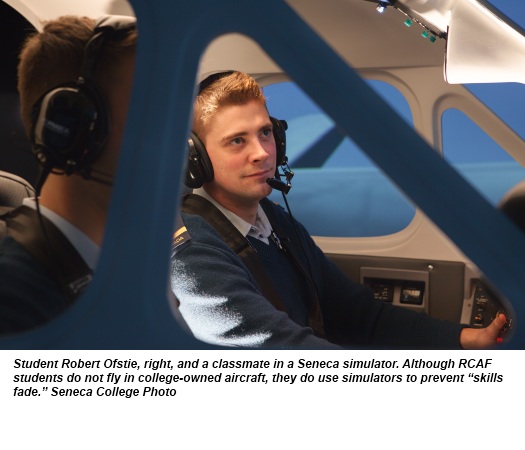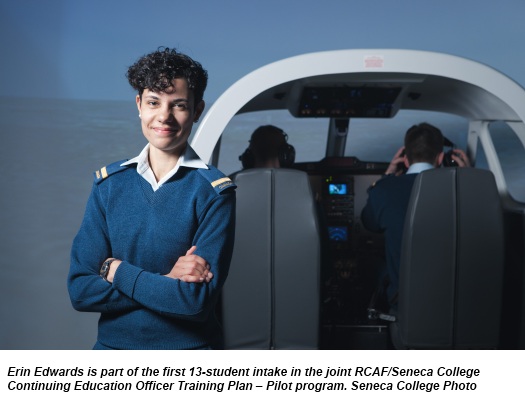Estimated reading time 5 minutes, 23 seconds.

Thirteen aviation students at Seneca College get to wear flight suits on Fridays. It’s their version of dressing down, compared to the full military dress uniforms they wear during the rest of the week.
The students are part of an innovative joint program being offered by the Toronto-area college and the Canadian Armed Forces (CAF). The new Continuing Education Officer Training Plan (CEOTP) – Pilot program has been designed to graduate a winged pilot with a Bachelor of Aviation Technology degree in just four years. That’s three years less time than it takes for a student to achieve the same qualifications at Royal Military College in Kingston, Ont.
The course has been more than three years in the making, and is the only program of its kind for the CAF pilot occupation. “The RCAF at large was looking for an opportunity to reduce the amount of time it took to graduate a pilot with a degree and their wings,” explained LCol Paul Fleury, who oversees the program from National Defence Headquarters in Ottawa. “Many years ago, an inquiry determined that officers in the CAF should have a degree. We do have officers in the CAF without a degree, but we’re taking all steps we can to facilitate those officers to obtain one.”
The first intake of CEOTP-Pilot students started at Seneca last September. The initial group of 13 has been integrated into the regular Bachelor of Aviation Technology program, although organizers hope to have enough students enrolled next year for a separate class.
“The idea of this program was for Seneca College to provide all of the academic requirements for the degree, and the CAF would be responsible for the flying portion,” said Fleury.
Over the four-year program, students will spend a total of five semesters at Seneca, with the balance of time spent doing flight training with the CAF. Students will not fly in Seneca aircraft, although they will use college simulators to maintain currency and prevent “skills fade.”
Fleury explained how the program application process works: “Students go to a CAF recruiting centre, where they learn about the many avenues to get into the RCAF as a pilot. Once they decide on the Seneca College program, they go through a series of tests to see if they qualify as a pilot candidate. Then, they go to aircrew selection where they are tested for skills such as multi-tasking and spatial orientation. During that process, the recruiting centre is interviewing them to make sure they have the military potential we require. Once we accept them, they go through an application process with Seneca College, too. It’s one of the most rigorous application processes in the RCAF.”

Once accepted into the CEOTP-Pilot program, students go to basic military officer training and then primary flight training. Their first semester at Seneca will begin in September, followed by another academic semester that sees them finish in April, before they return to the CAF for flight training. Once they attain their wings, candidates return to Seneca College for three consecutive semesters in order to complete their academic training.
Lynne McMullen, who is chair of the school of aviation at Seneca, told Canadian Skies that there are high expectations placed on the CEOTP-Pilot students. “It’s the same as in the Bachelor of Aviation Technology Program,” she said. “It’s very demanding. It’s not easy to get in, and then academically it’s demanding. You can’t slack and you have to stay focused from day one.”
The program is still in the trial stage, but both Fleury and McMullen said the first group is doing very well. “This group of students is so professional,” said McMullen. “They demonstrate such a good work ethic, and they carry themselves very well.”
Fleury said the CEOTP-Pilot program structure is being refined, with a French version also being considered. “We’re talking with Seneca to ensure that all the courses we provide from a flying perspective work into their requirements for a degree-granting institution,” he explained. As for the length of the program trial period, he said that’s still undetermined, although “we’d like to see this roll for a few years. The success will be proven over time.”
Once students graduate from the CEOTP-Pilot program, they are sent to a CAF operational training unit, where they are trained on the type of military aircraft they are going to fly. They are required to serve seven years with the CAF as a military pilot.








